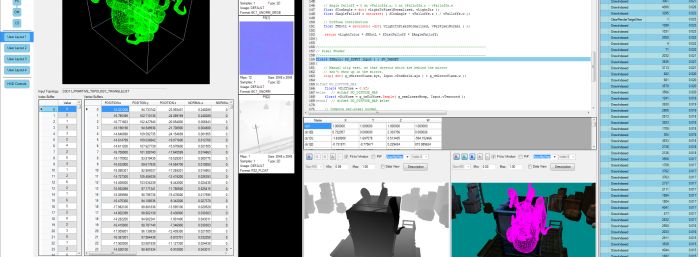
AMD has published a new version of GPU PerfStudio. GPU PerfStudio is a profiler and debugger for OpenGL and Direct3D (D3D10 and D3D11) applications.
GPU PerfStudio includes several tools:
- 1 – a frame debugger that allows you to visualize the graphics state and resources in your frame.
- 2 – a frame profiler that allows you to identify per draw call performance issues at the hardware counter level.
- 3 – a shader debugger that allows you to step through and analyze your shader code and its output.
- 4 – an API trace window with integrated CPU timing information.
GPU PerfStudio 2.8 includes the following changes:
- New Properties Window added to display text based data
- The previous text based windows have been replaced by a single properties window
- The default stage layouts have been edited to use this new window
- Shader Debugger
- Constant table UI improvements
- More assembly shaders are now debuggable
- Fix for for the register mask of the last instruction being black
- The contents of the Shader constant table can now be saved to disk
- Shader Editor now supports relative paths
- Profiler
- The Profiler now gives the user feedback as the profile is taking place
- Single Draw Call Profiling is now supported
- Ability to perfrom a profile a specific number of times
- Support for 7000 series Performance Counters
- Reduced the memory overhead when many counters are used in a profile
- Advanced Picture Viewer
- Now saves to disk the image that you actually see (i.e. the channels the user selects)
- DDS Support for DXGI_FORMAT_R32_UINT
- Client connection dailog now saves settings upon connection
- OpenGL
- OpenGL 4.1 Compute Shader now supported
- Support for OpenGL debug context
Maybe I missed something, but what are OpenGL 4.1 compute shaders?
More information about GPU PerfStudio and download HERE.
Ils fument chez AMD avec le “OpenGL 4.1 compute shaders”
Hmm… maybe they meant OpenCL… strange.
Unless AMD know about something we don’t.
@Cyril: je pense que la sortie des HD 7970 a un peu perturbé les équipes d’AMD 😉
@Leith: indeed I hope for them it’s OpenCL…